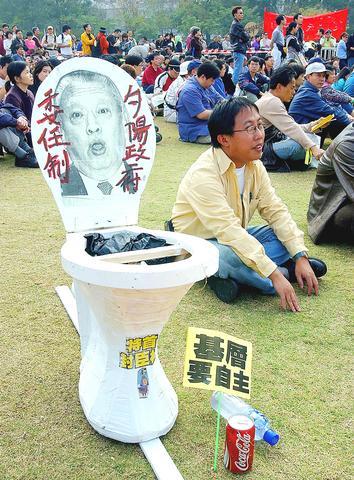Thousands of people marched through downtown Hong Kong on New Year's Day to demand full democracy in this former British colony, the biggest rally since a mass protest in July that threw the government into crisis.
Chanting "return power to the people," about 100,000 protesters marched from an urban park to the government headquarters, according to organizers. Police declined to provide their own crowd-size estimate, and there was no way to confirm the figure.

PHOTO: AP
The demonstration was seen as a crucial barometer of public sentiment, exactly six months after a half-million people took to the streets denouncing an anti-subversion bill proposed by the Hong Kong government, and backed by Beijing, as a threat to freedom.
"We have made history again!" said rally spokesman Richard Tsoi.
Yesterday's turnout exceeded predictions by organizers, who said earlier that people would have less impetus to protest this time.
The government's controversial proposal was shelved in October, and Hong Kong's economy -- another source of public discontent -- appears to be on the rebound.
Marchers -- many of whom also protested on July 1 -- said that wasn't enough.
"Democracy is something we need to maintain a fair society," said 40-year-old Connie Yau, a civil servant.
Since coming under Chinese rule in 1997, Hong Kong has enjoyed Western-style freedoms unheard of on the mainland, but remains only partially democratic.
Hong Kong's top leader Tung Chee-hwa (
Protesters yesterday heaped criticism on Tung, who has faced calls for his resignation over the anti-subversion bill and alleged economic mismanagement.
"Tung hasn't listened enough," said businessman Steve Lee.

DAREDEVIL: Honnold said it had always been a dream of his to climb Taipei 101, while a Netflix producer said the skyscraper was ‘a real icon of this country’ US climber Alex Honnold yesterday took on Taiwan’s tallest building, becoming the first person to scale Taipei 101 without a rope, harness or safety net. Hundreds of spectators gathered at the base of the 101-story skyscraper to watch Honnold, 40, embark on his daredevil feat, which was also broadcast live on Netflix. Dressed in a red T-shirt and yellow custom-made climbing shoes, Honnold swiftly moved up the southeast face of the glass and steel building. At one point, he stepped onto a platform midway up to wave down at fans and onlookers who were taking photos. People watching from inside

MAKING WAVES: China’s maritime militia could become a nontraditional threat in war, clogging up shipping lanes to prevent US or Japanese intervention, a report said About 1,900 Chinese ships flying flags of convenience and fishing vessels that participated in China’s military exercises around Taiwan last month and in January last year have been listed for monitoring, Coast Guard Administration (CGA) Deputy Director-General Hsieh Ching-chin (謝慶欽) said yesterday. Following amendments to the Commercial Port Act (商港法) and the Law of Ships (船舶法) last month, the CGA can designate possible berthing areas or deny ports of call for vessels suspected of loitering around areas where undersea cables can be accessed, Oceans Affairs Council Minister Kuan Bi-ling (管碧玲) said. The list of suspected ships, originally 300, had risen to about

A Vietnamese migrant worker yesterday won NT$12 million (US$379,627) on a Lunar New Year scratch card in Kaohsiung as part of Taiwan Lottery Co’s (台灣彩券) “NT$12 Million Grand Fortune” (1200萬大吉利) game. The man was the first top-prize winner of the new game launched on Jan. 6 to mark the Lunar New Year. Three Vietnamese migrant workers visited a Taiwan Lottery shop on Xinyue Street in Kaohsiung’s Gangshan District (崗山), a store representative said. The player bought multiple tickets and, after winning nothing, held the final lottery ticket in one hand and rubbed the store’s statue of the Maitreya Buddha’s belly with the other,

Japan’s strategic alliance with the US would collapse if Tokyo were to turn away from a conflict in Taiwan, Japanese Prime Minister Sanae Takaichi said yesterday, but distanced herself from previous comments that suggested a possible military response in such an event. Takaichi expressed her latest views on a nationally broadcast TV program late on Monday, where an opposition party leader criticized her for igniting tensions with China with the earlier remarks. Ties between Japan and China have sunk to the worst level in years after Takaichi said in November that a hypothetical Chinese attack on Taiwan could bring about a Japanese